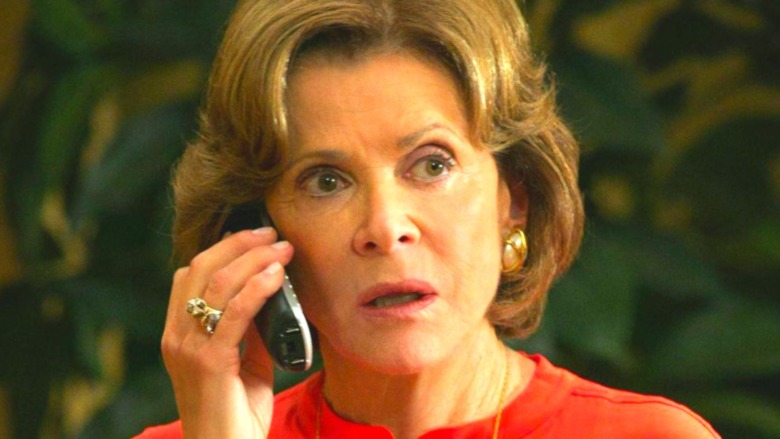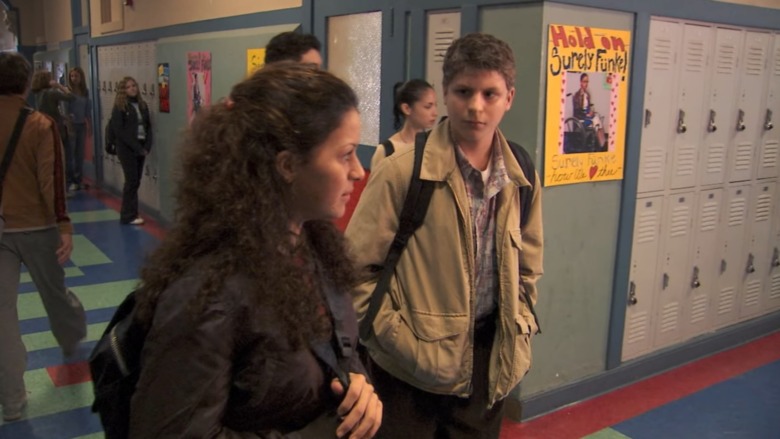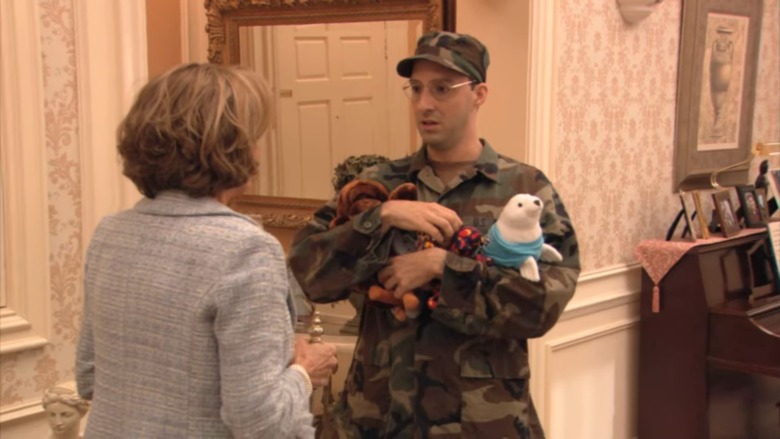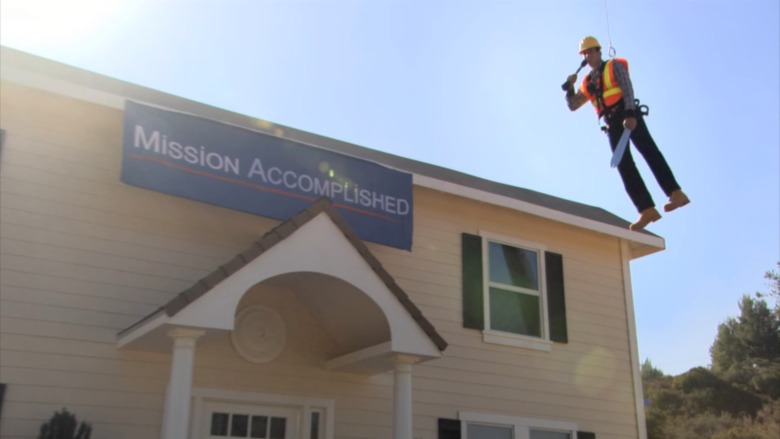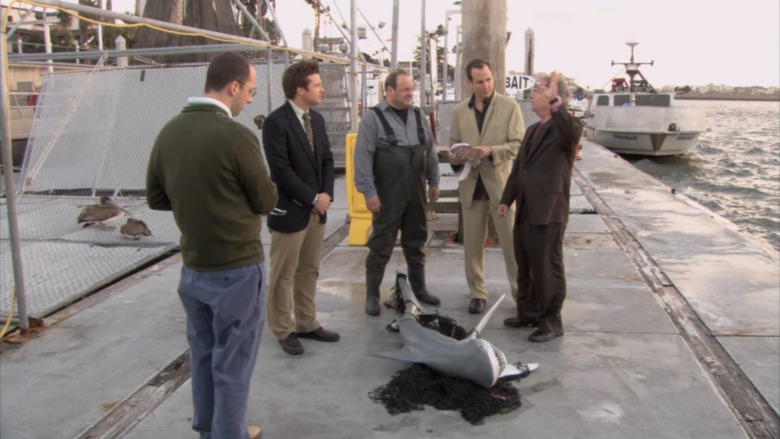Things You Only Notice In Arrested Development After Watching It More Than Once
Spoilers for "Arrested Development" Seasons 1-3
"Arrested Development" isn't regarded as one of the best TV comedies of all time for no good reason. From its iconic characters, such as the acerbic Lucille Bluth (the late, great Jessica Walters) and bumbling Dr. Tobias Fünke (David Cross), to the joke-a-minute scripts, the series more than earns its reputation.
The show is perhaps most fondly remembered for its rich comedic palette. There are running gags, jokes with multiple punchlines, and more background Easter eggs than you could shake a Bluth frozen banana at. All of those qualities also make it a terrific show to rewatch.
In fact, rewatching is arguably the best way to enjoy the series. Even if you've already seen all the episodes, there's no way you caught everything in its constellation of humor. A second (and third, and fourth, etc) viewing is almost required in order to really appreciate how finely crafted the show is.
Here are some of the things you only notice while doing an "Arrested Development" rewatch.
Keep your eyes on the background
You don't need to do multiple watches to pick up on the fact that there are tons of gags hidden in the background of scenes on "Arrested Development." In fact, there are so many background gags that it's extremely unlikely that you caught all of them during your first time through the series. Some are delightfully subtle, some are a "blink and you miss it" situations, and others play off of running gags that pop up throughout the show.
Take, for example, the Season 1 episode "Shock and Aww." If you keep your eyes on the walls of George Michael (Michael Cera) and Maeby's (Alia Shawkat) high school, you'll notice a poster hanging next to a bank of lockers that reads: "Hold on Surely Fünke!"
You likely missed it your first time around because the show didn't introduce Maeby's alter ego Surely, who suffers from an ultra-rare (aka made up) disease called BS, until several episodes later. The fundraising poster on the wall is a perfect little Easter egg for anyone who goes back to do another watch of the series.
Not only does it hilariously demonstrate how long Maeby has been keeping up the ruse, but it's also a great example of something else you probably missed during the first watch: all the times the show comedically foreshadowed events.
Arrested Development loves to subtly foreshadow events
When diving back into "Arrested Development" for a second watch, you're going to notice that several big events on the show were foreshadowed well in advance, ala the Surely Fünke poster. Speaking of Maeby, when she and George Michael meet in the pilot episode, he says to her, "Hey, you're my cousin, aren't you?" She replies, "Maybe." Her answer is both a homophone of Maeby's name and a nod to a plotline later in the series where Maeby's biological relationship to the rest of the Bluths is called into question.
Another example of this is the way the show dropped multiple clues that Buster (Tony Hale) would eventually have his hand bitten off by a seal and replaced with a hook. This development gets teased with visual hints, such as Buster sitting on a bench that reads "ARM OFF," as well as some more layered bits of foreshadowing.
In the Season 2 episode "Afternoon Delight," Buster plays the crane game at an arcade, an activity to which the narrator (Ron Howard) notes Buster "had gotten hooked." When he comes home with an armful of stuffed animal prizes, the one that is featured most prominently is a seal.
Did you catch all the references to the Bush family?
Although the appeal of "Arrested Development" has proved to be timeless thus far, the series itself is actually very rooted in the political and cultural climate of the early 2000s. This is especially true for the way the show makes connections between the Bluth family and the Bushes.
Some of these references are overt. Much of the core thrust of the narrative concerns George Bluth Sr's (Jeffrey Tambor) illicit dealings with Saddam Hussein's regime at the outset of the Iraq War, a conflict that was overseen by then-President George W. Bush. There's also the moment in the Season 2 episode "The One Where They Build a House" where the Bluth family hangs a banner that reads "Mission Accomplished" over an unfinished model home. That's a nod to President Bush's famous speech in front of a similar banner in the early days of the Iraq War, long before any mission was actually accomplished.
Although the individual personalities don't really match 1-for-1 with the Bushes, it seems as though the show wants to invite the comparison. Consider the fact that the creators added details like Gob Bluth's (Will Arnett) first name actually being an acronym for "George Oscar Bluth," the same way that Jeb Bush's first name stands for "John Ellis Bush."
The meta-moments that may have gone over your head
Another common "Arrested Development" bit are references to the real lives and careers of the actors who play the characters in the series. These can be easy to miss the first time around, as the meta-moments sometimes get lost in the fray. However, when you go back to rewatch armed with a bit more TV trivia, you'll notice lots of funny allusions.
One of the show's most popular guest stars is Henry Winkler, who plays the Bluth family's hapless lawyer Barry Zuckerkorn. Winkler has had a long and distinguished career in the entertainment industry, but he's perhaps best known for his role as cool-guy the Fonz on nostalgia sitcom "Happy Days."
Throughout "Arrested Development," the show takes plenty of opportunities to reference Winkler's famous role. One of the funniest is in the Season 2 episode "Motherboy XXX" when Barry exits a scene on a dock by hopping over an inflatable shark. This is a reference to a now-infamous moment from "Happy Days" in which the Fonz jet skis over a shark as part of a dare.
The scene became the inspiration for the phrase "jumping the shark," which, according to TV Tropes, refers to the moment a long-running show introduces a big change to its tone or dynamics to try and "update in order to stay fresh." It was also used by "Arrested Development" to give viewers who know Winkler from his previous roles a big laugh.
Those are just a handful of examples of things you likely missed the first time you watched "Arrested Development." Now that you know what to look for, it's time to go all the way back to Episode 1 and hit play.
